Author: Valentyna Chabanova-Babak, Content Manager, Link platform
The legal component of the Link local humanitarian response coordination mechanism began operating just over a year ago—in May 2024. It is implemented by the Legal Development Network in partnership with the Czech humanitarian organization People in Need, funded by the UK government. As of mid-August, our lawyers have collected and verified 239 legal needs in de-occupied communities of Kherson and Mykolaiv oblasts. This material reveals the picture of citizens’ legal needs through the lens of three key aspects: the most pressing legal issues, traditional channels of requests, and the profile of a typical legal services recipient.
In Kherson Oblast, 160 legal needs were recorded, and in Mykolaiv Oblast—79. Most often, lawyers receive requests directly during field visits to settlements to gather information. A significantly smaller number of requests come by phone, through referrals from humanitarian needs assessment specialists and partners, during group consultations, and legal education games. Some requests are received through the hotline, online chat, messenger, and during legal education events, though these are currently isolated cases.
MOST COMMON WAYS OF RECEIVING REQUESTS
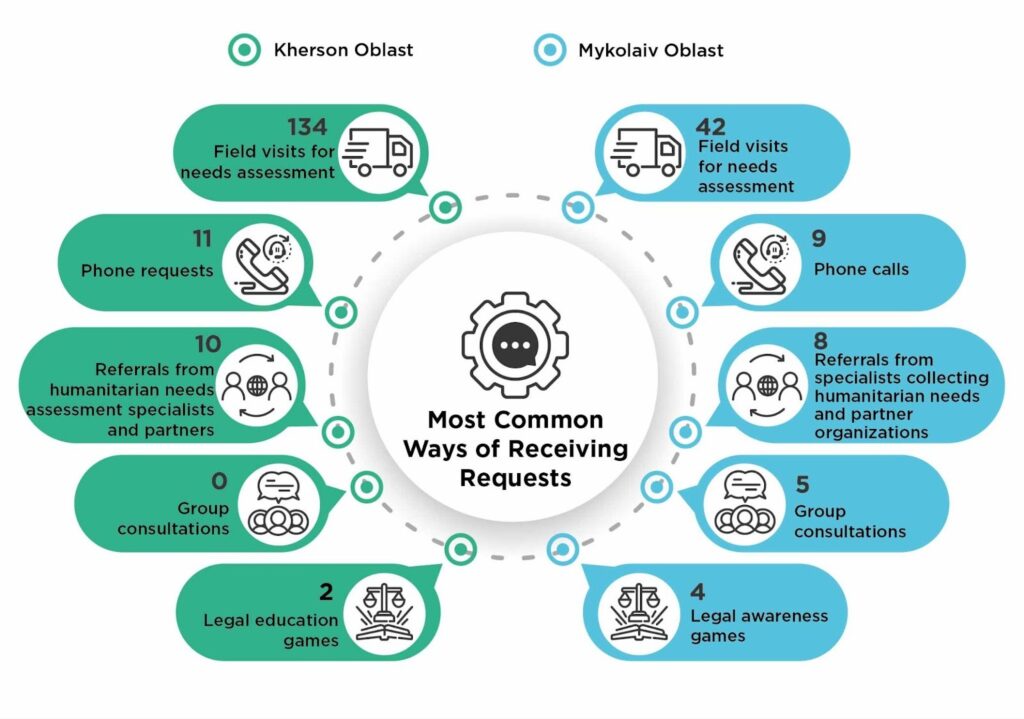
In Kherson Oblast, the greatest number of needs were recorded in the area of civil law. Specifically, the procedure for documenting damage to receive compensation for damaged or destroyed property, registration of property rights to real estate, restoration of lost documents, and conclusion and termination of legal transactions. Many requests concern inheritance: its acceptance, inheritance of damaged property, drafting wills, and recognition of property rights to inherited property.
Performing registration actions is the most common request in the area of administrative law. In matters of social security, most requests are marked as “Other.” In this case, “Other” relates to social security and includes requests such as: registration of status for children affected by hostilities; registration of financial assistance; registration of compensation for civilians who returned from captivity, etc. In land law, most requests concern land lease and privatization of land plots.
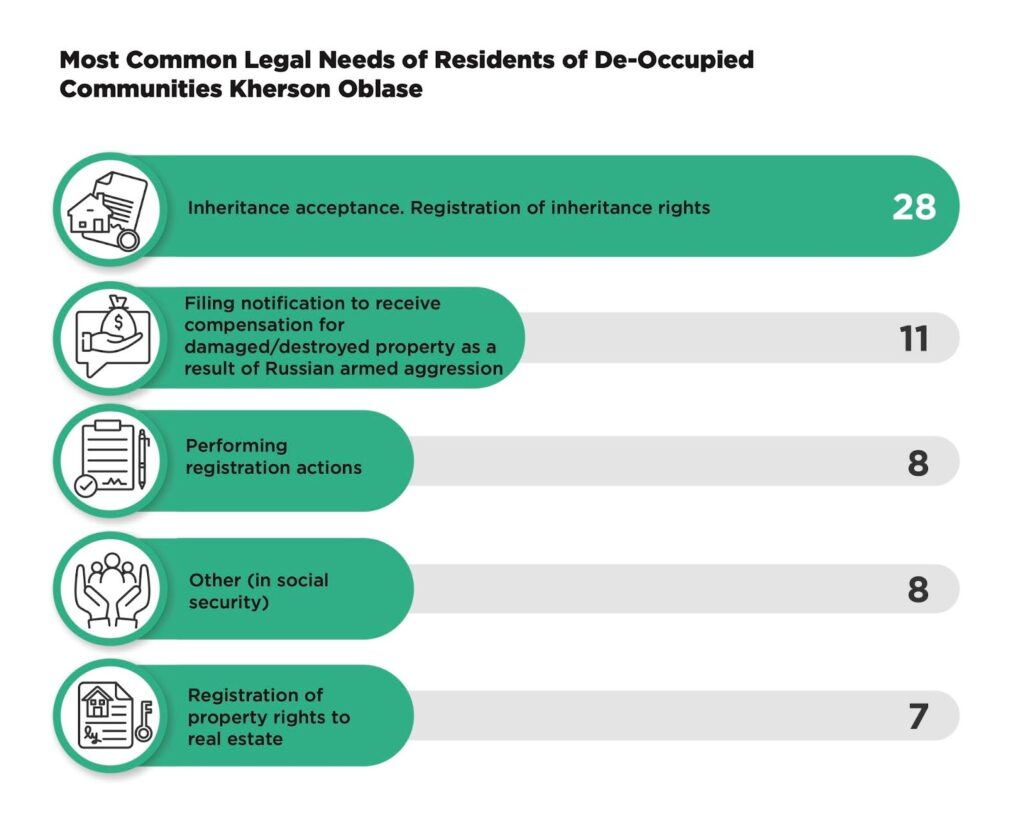
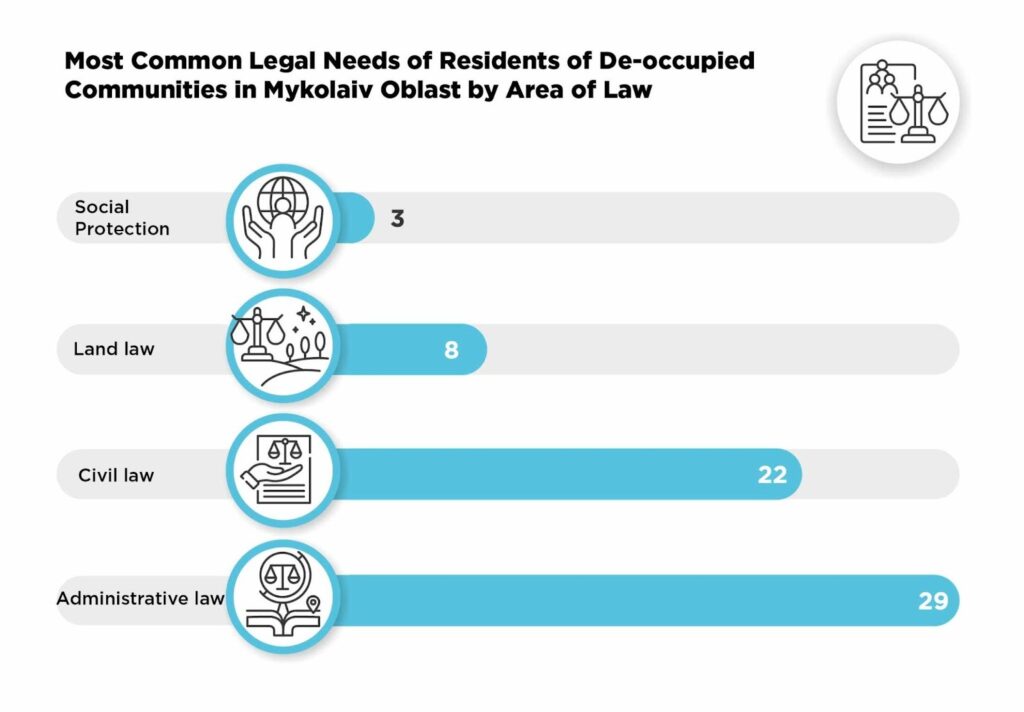
In Mykolaiv Oblast, residents’ typical needs are similar to those recorded in Kherson Oblast. Most requests are in the areas of administrative and civil law. Specifically, performing registration actions, processing documents, appealing decisions, actions, and inaction. In civil law matters, most requests concern the conclusion, execution, and termination of contracts, restoration of documents for residential property, and registration or recognition of property rights to destroyed residential property. There are also many requests regarding inheritance acceptance. Among legal needs in the area of land law, the leader is the issue of contracts regarding the fulfillment of lease agreement terms for agricultural land plots.
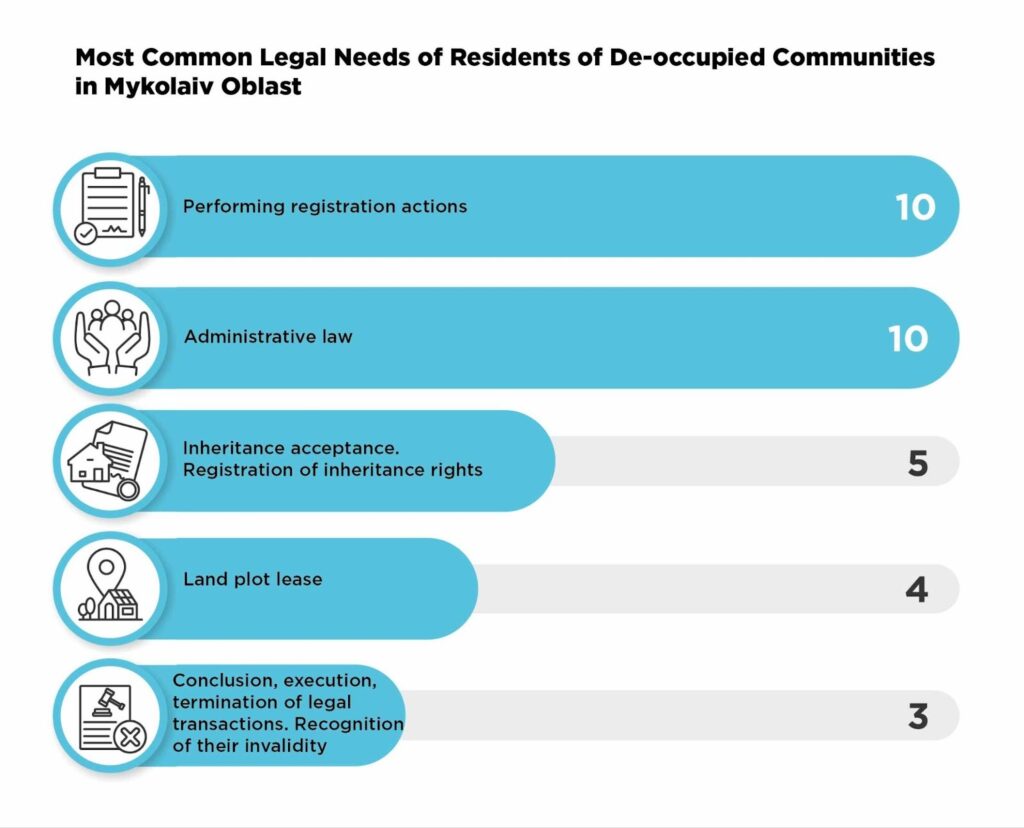
In the sample by sub-areas of law, the most requests concern performing registration actions and “Other” in the area of administrative law. In this case, “Other” includes various issues that are difficult to classify into one category. For example, regarding border crossing, obtaining an extract about completed state registration of ownership rights to a land plot, changing place of registration if the previous place of registration is in occupied territory, etc. Half as many requests concern inheritance acceptance. Rounding out the top five are requests regarding land plot lease, as well as conclusion, execution, and termination of legal transactions.
Having analyzed how many of the 239 requests relate to problems connected with other settlements, we have currently recorded only one such request. Its essence lies in the need to process title documents for a house located in a different settlement than where the applicant currently resides.
Client Profile: Statistics by Categories of Population Who Most Often Seek Legal Assistance
Kherson Oblast
In Kherson Oblast, the main portion of clients who sought legal assistance belongs to the age category 35-59 years—80 people. Also, a very significant age category is people 60+—72 such individuals. A small number are people younger than 35 years, falling into the 25-34 years category: 8 people. The majority of clients are women—123. Men—37 people.
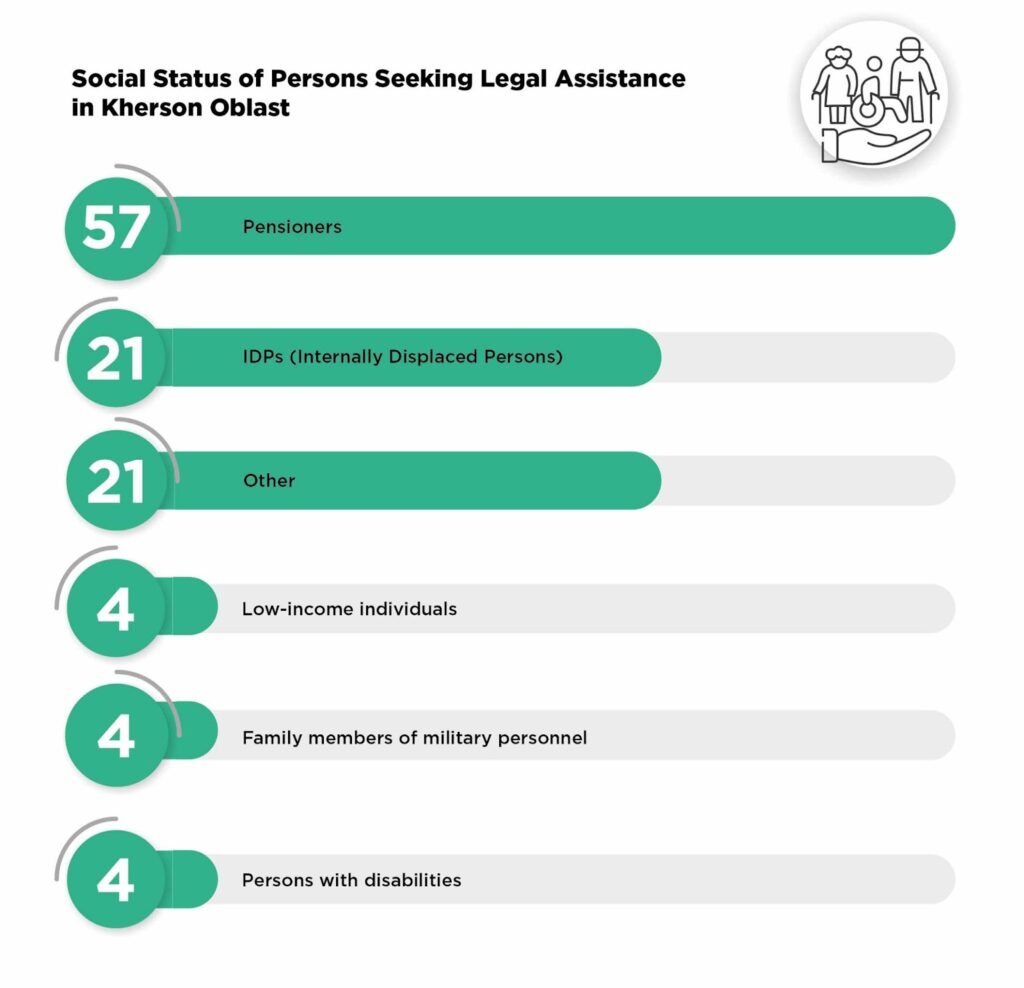
Regarding clients’ social status, the most requests are from pensioners—57 requests, from internally displaced persons—21 requests, four each from low-income individuals, family members of military personnel, and people with disabilities. Two requests—from people who returned home. “Other”—21 people. 53 clients did not identify their social status. The total number of social statuses is greater than 160, as combinations of categories occur. For example, IDP and person with disability, family member of military personnel and person with disability, etc.
Mykolaiv Oblast
In Mykolaiv Oblast, the age distribution is similar to Kherson Oblast. The most requests for assistance are from 39 people aged 35-59 years. In second place with a slight gap are requests in the 60+ age category—34 people. Two requests from people in the 25-34 years age category, and one from a person 18-24 years. For three people, the age category was not identified. The absolute majority of clients are women—61. Men—15 people. In three cases, gender was not specified.
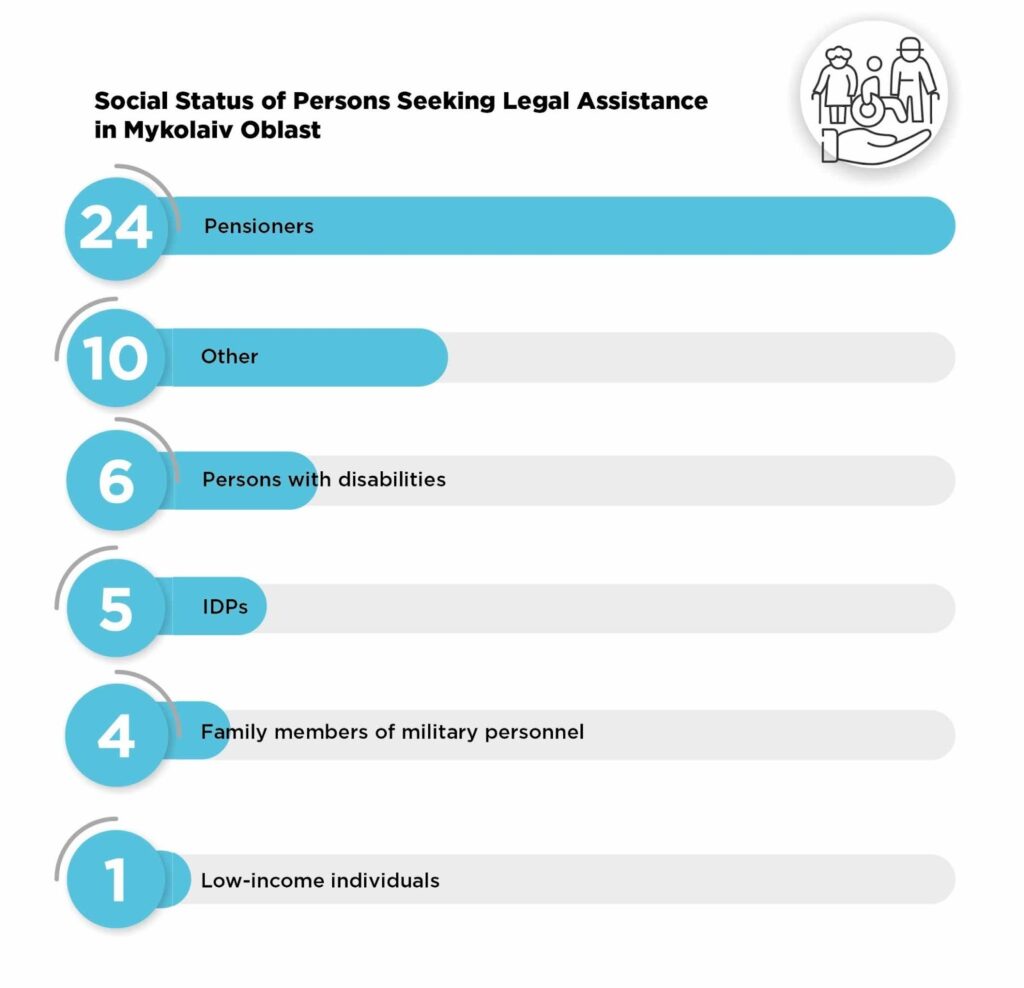
The most requests also came from pensioners—24 needs recorded. “Other”—10 needs, six from people with disabilities, five from internally displaced persons, and four—from family members of military personnel. 30 did not identify their social status. One case involves a combination of categories: person with disability and low-income person.
As a reminder, the Link local humanitarian response coordination mechanism is implemented by the Legal Development Network in partnership with the Czech humanitarian organization People in Need, funded by the UK government. Link helps connect those who need assistance with those who can provide it.